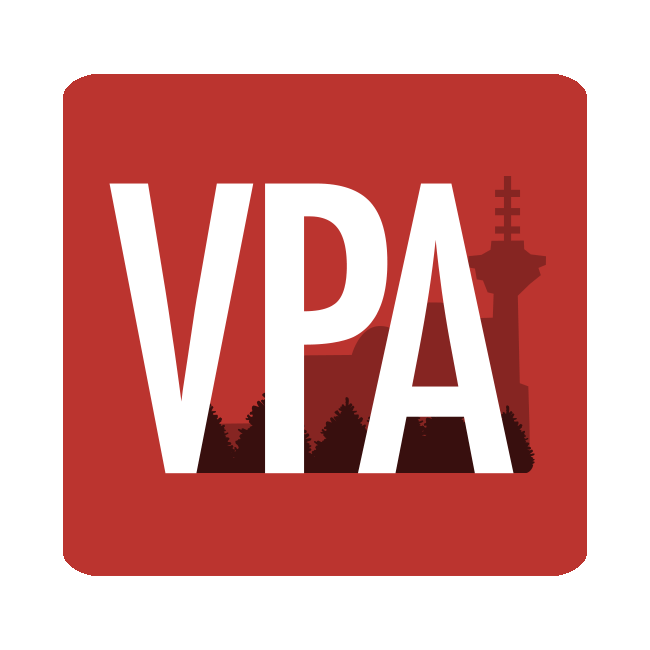
Our Anti-discrimination and Anti-harassment
Policy and Procedures
Policy Statement
The Vancouver Post Alliance Society (The VPA) is committed to fostering a safe environment free of discrimination and harassment, where all individuals are treated with respect and dignity, can contribute fully and have equal opportunities.
The VPA has policy, procedures, education and expectations to create and support a respectful environment for its membership.
General Guidelines / Objectives
The Human Rights Code, RSBC 1996, c 210: 14 (c) protects individuals from discrimination, harassment and disrespectful behaviour based on race, national or ethnic origin, colour, religion, age, sex, sexual orientation, marital status, family status, disability or pardoned conviction.
Harassment, discrimination and disrespectful behaviour will not be tolerated, condoned or ignored at The VPA. If a claim or harassment or discrimination is proven, corrective measures will be applied, up to and including termination of the membership or contract, removal from a position, and/or revocation of access to the VPA meetings and events.
The VPA members, board members, volunteers and contractors are accountable for their own behaviour and are expected to conduct themselves in a respectful and appropriate manner at all times. As the representatives of VPA, we are ambassadors and will behave in accordance with this policy whether in our meetings or events. Examples of respectful behaviour that create a safe space for our members include:
- Respecting everyone’s identity including gender identity and expression
- The ability to raise issues and voice your opinion and belief without the fear of retaliation
- Clear and accessible language is used
- Accessibility needs, visible and invisible, are respected and accommodated
- Cultural and religious beliefs are respected and celebrated
- A place where bias is questioned and examined
VPA commits to work from a place of anti-oppression and examine the systems in place that may contribute to an imbalance of power between our members. We recognize that an intersectional approach needs to be taken with every single one of our members. We aim to not only be reactive but also proactive and work to tackle the root causes of discrimination and harassment through continued training as well as creating a safe place for open dialogue.
The VPA is committed to a comprehensive strategy to address harassment and discrimination, including:
- Providing education to make sure everyone knows their rights and responsibilities. This includes education on how oppression, privilege and bias can show up in interactions.
- Regularly monitoring organization systems for barriers relating to Act grounds and actively working to remove them.
- Providing effective and fair complaints procedures from the lens of equity, anti-oppression and intersectionality.
- Promoting appropriate standards of conduct at all times.
Application
This policy applies to all current members of The Vancouver Post Alliance Society, including all membership levels, board members, volunteers, sponsors, guests and associates. This policy also applies to member applicants.
Conduct prohibited by this policy can occur directly from person to person and via electronic communications including e-mail, internet and social media, whether used or engaged in at The VPA meetings and events or off-site with personal equipment/devices. Off duty conduct that has an impact at the events of VPA may be subject to this policy.
Protected Grounds
This policy prohibits discrimination or harassment based on the following grounds, and any combination of these grounds from the Human Rights Code, RSBC 1996, c 210: 14 (c):
- Race
- Colour
- Ancestry
- National Origin
- Citizenship
- Immigration Status
- Place of birth
- Ethnicity, Language or Accent
- Religion or Religious Degree
- Creed
- Age
- Sex (including pregnancy, childbirth, breastfeeding or related medical conditions)
- Sexual orientation
- Gender identity
- Gender expression
- Disability (including mental, physical, developmental or learning disabilities)
- Family status or family responsibilities (such as having children)
- Marital or Domestic Partnership status (including married, common-in-law, single, widowed, divorced, separated or living in a conjugal relationship outside of marriage, whether in a same-sex or opposite-sex relationship)
- Personal Appearance
- Political Affiliation or Activities
- Unemployment Status
- Source of Income
- Record of offences (criminal conviction for a provincial offence, or for an offence for which a pardon has been received)
- Association or relationship with a person identified by one of the above grounds
- Declining to Engage in Religious or Political Meetings or Communications
- Perception that one of the above grounds applies.
The VPA recognizes that we have a duty to accommodate in order for everyone to be treated equally and fairly. Where a protected ground of discrimination is involved — such as a person’s physical disability, age, or marital status — VPA commits to doing what we can to remove barriers or make adjustments to accommodate the member.
Definitions
Discrimination: means any form of unequal treatment based on a Code ground, whether imposing extra burdens or denying benefits. It may be intentional or unintentional. It may involve direct actions that are discriminatory on their face, or it may involve rules, practices or procedures that appear neutral, but disadvantage certain groups of people. Discrimination may take obvious forms, or it may happen in very subtle ways. Even if there are many factors affecting a decision or action, if discrimination is one factor, that is a violation of this policy. This excludes any reasonable action taken by an employer or supervisor relating to the management and direction of workers or the place of employment. Examples of discrimination can include:
- Verbal or written slurs
- Exclusion
- Demotion or lack of advancement
- Microaggressions
- Tone policing
- Stereotyping – racial profiling and labelling of persons
Harassment: means a course of comments or actions that are known, or ought reasonably to be known, to be unwelcome. It can involve words or actions that are known or should be known to be offensive, embarrassing, humiliating, demeaning or unwelcome, based on a ground of discrimination identified by this policy. Harassment can occur based on any of the grounds of discrimination.
Examples of harassment include:
- Derogatory nicknames, remarks, jokes or comments related to a person’s race, gender identity, gender expression, sex, disability, sexual orientation, creed, age, or any other ground
- Posting or circulating offensive pictures, drawings, writings or materials, whether in print form or via e-mail or other electronic means
- Singling out a person for humiliating or demeaning teasing or jokes because they are a member of a Code-protected group
- Comments ridiculing a person because of characteristics that are related to a ground of discrimination. For example, this could include comments about a person’s dress, speech or other practices that may be related to their sex, race, gender identity or creed.
If a person does not explicitly object to harassing behaviour, or appears to be going along with it, this does not mean that the behaviour is okay. The behaviour could still be considered harassment under the Code. VPA recognizes that some marginalized people may be reluctant to report any incidents of harassment or discrimination. We commit to being vigilant of any incidents and resolving issues fairly and to approach from an anti-oppressive intersectional lens
Sexual and gender-based harassment: sexual harassment is a form of harassment that can include:
- Gender-related comments about a person’s physical characteristics or mannerisms Paternalism based on gender which a person feels undermines his or her self respect or position of responsibility
- Unwelcome physical contact
- Suggestive or offensive remarks or innuendoes about members of a specific gender Propositions of physical intimacy
- Gender-related verbal abuse, threats or taunting
- Leering or inappropriate staring
- Bragging about sexual prowess or questions or discussions about sexual activities
- Offensive jokes or comments of a sexual nature about an employee or client Rough and vulgar humour or language related to gender
- Display of sexually offensive pictures, graffiti or other materials including through electronic means
- Demands for dates or sexual favours which may be asked in exchange for promotion or advancement.
Bullying: Bullying is a form of aggression where there is a power imbalance; the person doing the bullying has power over the person being victimized. Like harassment, bullying can be physical, psychological, verbal and can happen in person or online.
Bullying and harassment are similar, yet different:
- Harassment is similar to bullying because someone hurts another person through cruel, offensive and insulting behaviours
- Harassment is different from bullying in that it is a form of discrimination.
Racism: The inability or refusal to recognize the rights, needs, dignity, or value of people of particular races or geographical origins. More widely, the devaluation of various traits of character or intelligence as ‘typical’ of particular peoples.
Anti-oppression: Anti-Oppression includes the strategies, theories, actions and practices that actively challenge systems of oppression on an ongoing basis in one’s daily life and in social justice/change work. Anti-oppression work seeks to recognize the oppression that exists in our society and attempts to mitigate its effects and eventually equalize the power imbalance in our communities.
Equity: Equity takes into account the effects of discrimination and aims for an equal outcome. Equity is different to equality. Equality gives everyone the same solutions to a problem. This in turn causes those with privilege to continue to get ahead. Instead, equity examines the individuals needs and provides a solution to balance the power for all.
Intersectionality: Intersectionality coined by the legal scholar Kimberlé Crinshaw in 1989 describes the complex, cumulative way in which the effects of multiple forms of discrimination (such as racism, sexism, and classism) combine, overlap, or intersect especially in the experiences of marginalized individuals or groups. Intersectionality is important in understanding the multiple and layered ways of discrimination and oppression some communities face. The original meaning highlighted the intersections of oppression experienced by Black women. We are grateful to be able to use this term in a broader sense.
Microaggressions: Microaggression is a term used for brief and commonplace daily verbal, behavioural, or environmental indignities, whether intentional or unintentional, that communicate hostile, derogatory, or negative prejudicial slights and insults towards others, typically marginalized people. Microaggressions uphold oppressive power structures and overtime, create significant stress and trauma.
Privilege: Privilege refers to the unquestioned and unearned set of advantages, entitlements, benefits and choices bestowed on people solely because of characteristics like their gender, the colour of their skin or where they come from. Generally people who experience such privilege do so without being conscious of it.
Tone Policing: Tone Policing refers to when a person tries to diminish the validity and importance of a statement by attacking the tone in which it was said or presented, instead of the message itself. It is yet another tool used to protect privilege instead of understanding the structures of oppression that exist in our society.
Roles, Responsibilities and Expectations
The VPA Board is responsible for:
- conduct themselves in a respectful and appropriate manner.
- comply with this policy by not engaging in discrimination and harassment.
- participate in a Diversity and Inclusion workshop annually
- create a safe environment by taking reasonable steps to ensure it is free from discrimination and harassment.
- intervene when any unacceptable behaviour is observed whether or not it is reported; and
- facilitate, support and participate in the investigation process of reported incidents.
The Diversity & Inclusion Committee is responsible for:
- the administration of this policy;
- reviewing this policy annually, or as required;
- making necessary adjustments to ensure that this policy meets the organization’s needs; and
- communicating any policing updates as well as training and facilitation of these said updates.
Members are responsible for:
- Familiarizing themselves with this policy
- treating others with respect and dignity in the organization;
- reporting harassment to The Diversity & Inclusion Committee;
- cooperating with a discrimination and / or harassment investigation and respecting the confidentiality related to the investigation process;
Members can expect:
- to be treated with respect and dignity in the organization;
- that reported harassment and / or discrimination will be dealt with in a timely, confidential and effective manner;
- to have their rights to a fair process and to confidentiality respected during a harassment and / or discrimination investigation; and
- to be protected against retaliation for reporting harassment and / or discrimination or cooperating with an investigation.
Procedures for Addressing a Complaint
Filing a Complaint
Should an incident occur at a VPA hosted event, a member may file a discrimination or harassment complaint by contacting The Diversity & Inclusion Committee. The complaint may be verbal or in writing. If the complaint is made verbally, The Diversity & Inclusion Committee will record the details provided by the member.
The member should be prepared to provide details such as what happened; when it happened; where it happened; how often and who else was present (if applicable).
Complaints should be made as soon as possible, unless there are circumstances that prevent the member from doing so.
The Diversity & Inclusion Committee will tell the person for whom the discrimination or harassment complaint has been made against, in writing, that a harassment complaint has been filed. The letter will also provide details of the allegations that have been made against them. The VPA commits to using clear, accessible language free from judgment and labels.
Every effort will be made to resolve discrimination or harassment complaints within a reasonable amount of time. The VPA Board will advise both parties of the reasons why, if this is not possible.
If either party to a discrimination or harassment complaint believes that the complaint is not being handled in accordance with this policy, they should contact The VPA Board.
Mediation
Wherever appropriate and possible, the parties to the discrimination or harassment complaint will be offered mediation prior to proceeding with an investigation.
Mediation is voluntary and confidential. It is intended to assist the parties to arrive at a mutually acceptable resolution to the complaint.
The mediator will be a neutral, unbiased, external person, with a background in equity and inclusion, agreed upon by both parties.. The mediator will not be involved in investigating the complaint. The mediator may meet with each person prior to the mediation to gather their own information.
VPA commits to using clear, accessible language, free from judgement and labels.
Each party to the complaint has the right to be accompanied and assisted during mediation sessions by a person of their choosing.
Investigation
If mediation is inappropriate or does not resolve the issue, an investigation will be conducted. All investigations will be handled by an individual who has the necessary training and experience. In some cases, an external consultant may be engaged for this purpose.
The investigator will interview the person who made the complaint, the person the complaint was made against and any witnesses that have been identified. All people who are interviewed will have the right to review their statement, as recorded by the investigator, to ensure its accuracy. During the investigation, information may be gathered by examining sources such as CCTV footage, emails, memos and witness testimonies.
The investigator will prepare a report that will include:
- a description of the allegations;
- the response of the person the complaint was made against;
- a summary of information learned from witnesses (if applicable); and
- a decision about whether, on a balance of probabilities, harassment did occur.
This report will be submitted to The VPA Board. Both parties to the complaint will be given a copy.
Investigations will be:
- prompt and there will be open communication to both sides on the process
- fair and impartial – providing fairness to both sides
- sensitive to confidentiality
- come from an anti-oppression and intersectional lens
- be focused on finding facts and not passing judgement
The remedy processes offered by the VPA do not go against a person’s right to lodge a complaint with a body such as the BC Human Rights Tribuna.
The appropriate authorities will only be called as a last resort. We recognize that some marginalized communities have been mistreated by law enforcement in the past. We commit to assess every situation and to only call law enforcement when it is absolutely necessary.
Substantiated Complaint
If a harassment complaint is substantiated, The VPA Board will decide what action is appropriate.
The VPA will provide learning opportunities for the member found to have engaged in the behaviour with suspension and dismissal being the last resort. The VPA commits to fair dismissals or suspensions that are based solely on misconduct and does not discriminate on bases including but not limited to: age, sex, ethnicity, pronouns, sexual orientation and other personal characteristics
Both parties to the complaint will be advised, in writing, of the decision. One month after the resolution, the D&I committee will check-in with the complainant to see:
- if the resolution has been effective and to get feedback on the resolution process
- their mental well-being
- How their security and safety is at the VPA
VPA will take each incident as an opportunity to learn how to prevent any future incidents.
Privacy and Confidentiality
All parties to a complaint are expected to respect the privacy and confidentiality of all other parties involved and to limit the discussion of a discrimination or harassment complaint to those that need to know.
The Vancouver Post Alliance Society and all individuals involved in the discrimination or harassment complaint process, will comply with all requirements of British Columbia’s privacy laws to protect personal information.
Review
The Vancouver Post Alliance Society will review this policy and procedures on an annual basis, or as required, and will make necessary adjustments to ensure that it meets the needs of all members.
Enquiries
Enquiries about this policy and related procedures can be made to The Diversity & Inclusion Committee.

